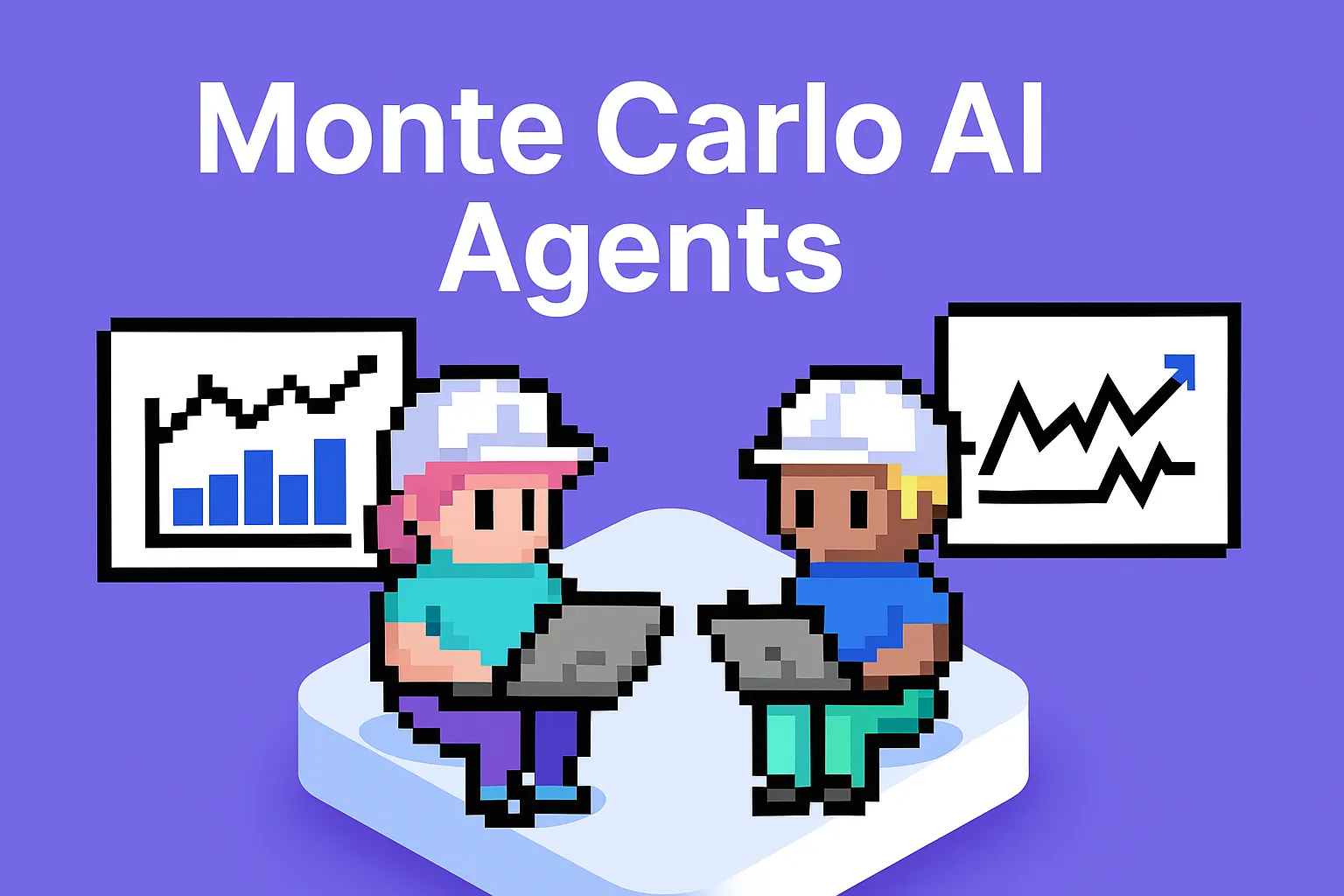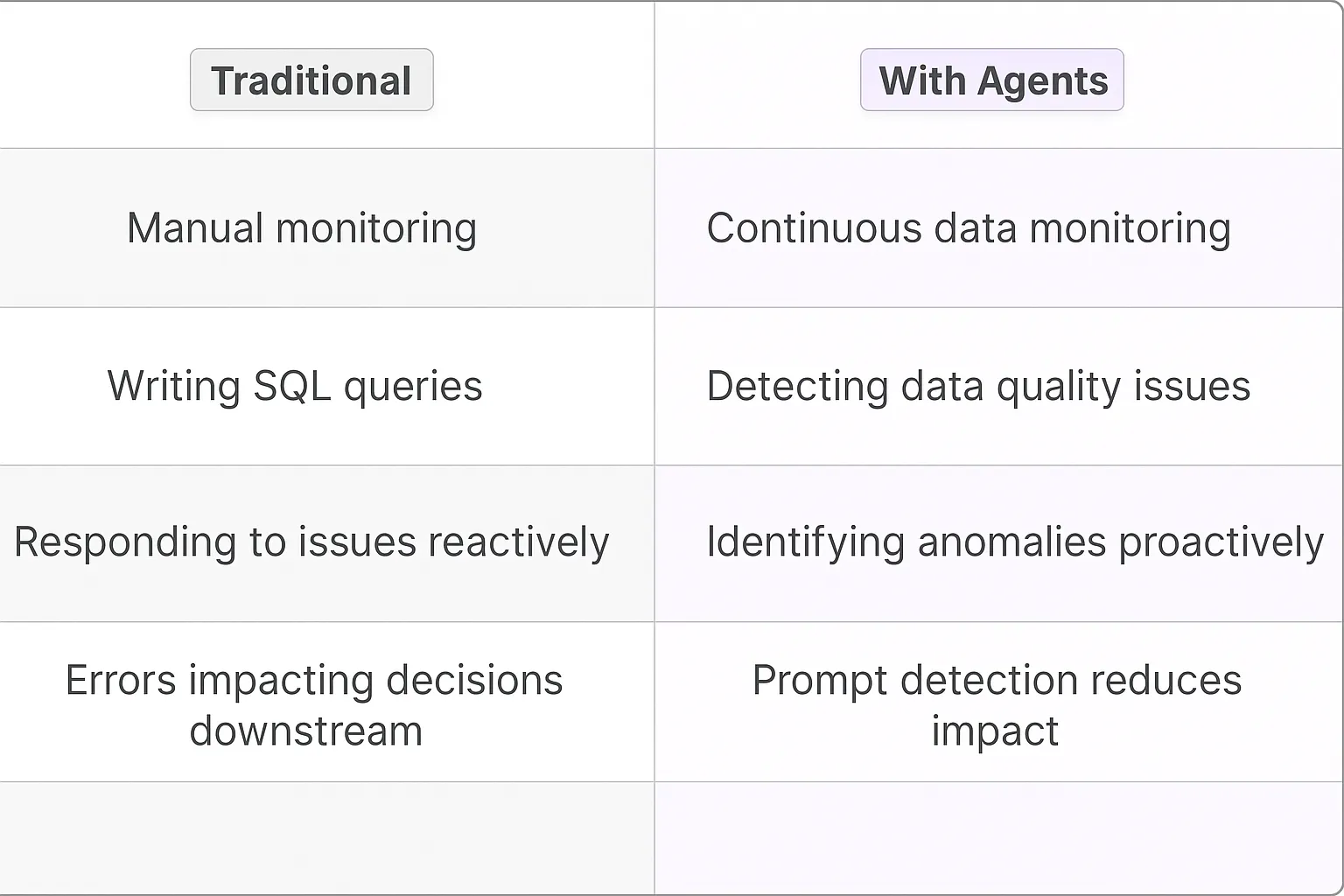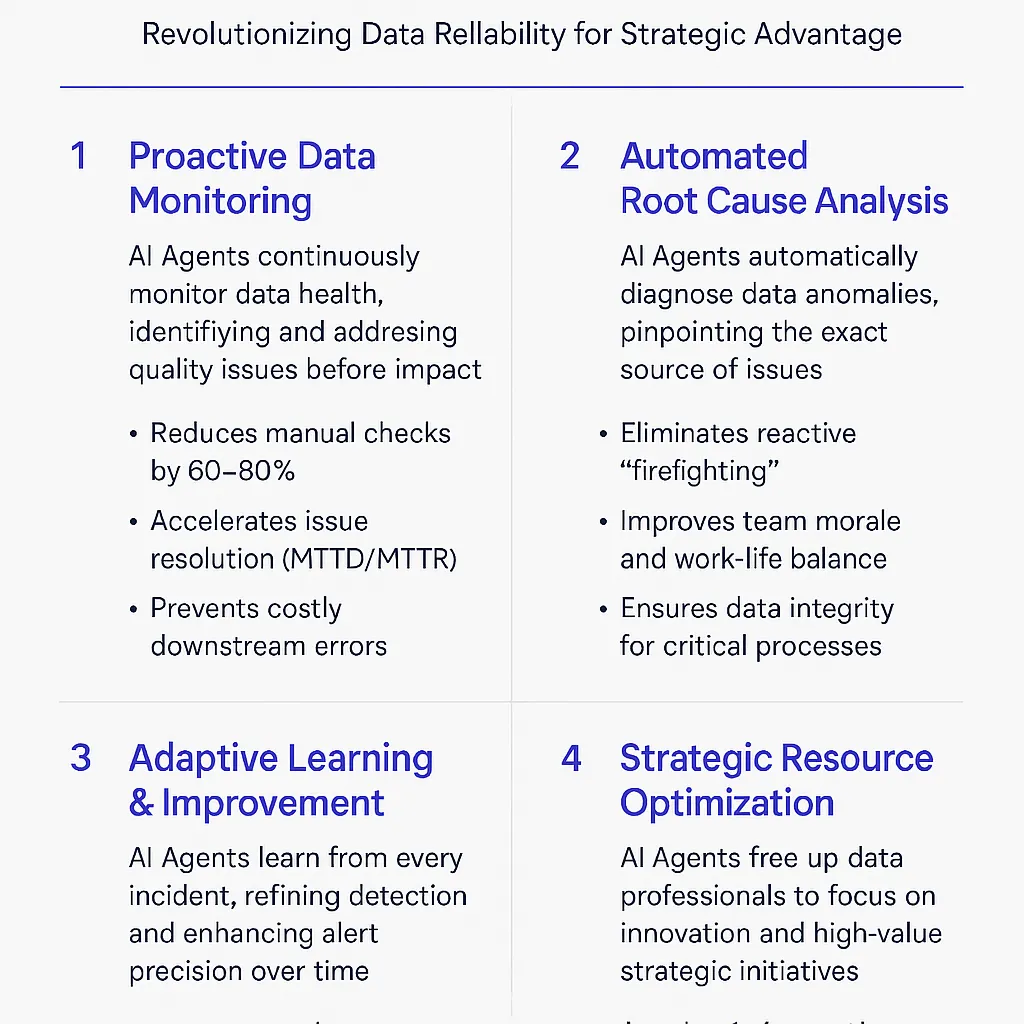Monte Carlo
Understanding Monte Carlo's Core Principles
What is Monte Carlo?
Monte Carlo is a sophisticated computational method that uses repeated random sampling to obtain numerical results and predict the probability of different outcomes. When combined with AI, it creates powerful digital teammates capable of running millions of simulations to solve complex problems that would be impossible to calculate analytically. The system excels at handling uncertainty and providing probabilistic insights for decision-making.
Key Features of Monte Carlo
- Probabilistic simulation capabilities that model complex scenarios
- Machine learning integration for pattern recognition and anomaly detection
- Adaptive learning systems that improve with each simulation run
- Real-time monitoring and alert systems for data quality issues
- Sophisticated risk assessment and prediction capabilities

Benefits of AI Agents for Monte Carlo
What would have been used before AI Agents?
Data teams traditionally relied on manual monitoring and reactive troubleshooting to maintain data quality and reliability. Engineers spent countless hours writing SQL queries, checking dashboards, and responding to stakeholder complaints about broken data pipelines. The process was inefficient and error-prone, with issues often discovered only after they impacted downstream analytics and decision-making.
What are the benefits of AI Agents?
AI Agents transform data reliability by acting as specialized digital teammates that continuously monitor data health across the entire stack. They detect anomalies and data quality issues before they cascade into bigger problems, reducing the mean time to detection and resolution.
The agents apply machine learning to establish baseline metrics and patterns, enabling them to identify subtle deviations that human analysts might miss. When issues arise, they automatically diagnose root causes and suggest specific fixes, eliminating hours of manual investigation.
For data engineers, this means fewer midnight alerts and more time for strategic work. The agents handle routine monitoring and first-level troubleshooting, allowing teams to focus on data architecture and innovation. They also maintain detailed audit trails of all detected issues and resolutions, creating an institutional knowledge base that improves over time.
Most importantly, these AI Agents adapt to each organization's unique data environment. They learn from historical incidents, team responses, and system behaviors to provide increasingly precise and relevant alerts. This continuous learning loop transforms data reliability from a reactive firefighting exercise into a proactive, systematic process.
The network effects are particularly powerful - as more teams use these agents, they become better at predicting and preventing data issues across similar data architectures and use cases. This creates a flywheel effect where each resolved incident makes the entire system more robust.

Potential Use Cases of Monte Carlo AI Agents
Processes
- Data quality monitoring across multiple databases and data warehouses, detecting anomalies and drift patterns before they impact downstream analytics
- Automated root cause analysis of data pipeline failures, identifying common failure points and suggesting preventive measures
- Real-time data lineage tracking to map dependencies between different data assets and their impact on business metrics
- Proactive schema change detection and impact assessment across the data stack
Tasks
- Setting up intelligent alerts based on historical patterns and seasonality in data quality metrics
- Generating detailed incident reports with contextual information about data quality issues
- Creating and maintaining data quality SLAs based on business criticality
- Automating metadata collection and documentation for data assets
- Monitoring query performance and resource utilization across data warehouses
The Growth Impact of Monte Carlo AI Agents
Monte Carlo AI agents represent a fundamental shift in how data teams operate. These digital teammates handle the heavy lifting of data reliability, allowing data engineers and analysts to focus on high-impact strategic work.
The network effects in data quality become apparent as these agents learn from patterns across the entire data stack. Each incident detected and resolved strengthens the system's ability to prevent similar issues across other data assets.
Data teams using Monte Carlo AI agents typically see a 60-80% reduction in time spent on manual data quality checks. This translates to faster development cycles and more reliable data products. The compound effect is significant - when data teams can trust their data infrastructure, they ship features faster and with higher confidence.
The most successful implementations occur when organizations treat these AI agents as integral members of their data teams rather than just monitoring tools. They become the first line of defense for data quality, enabling human team members to focus on strategic initiatives that drive business value.
Integration Points
- Direct integration with data warehouses like Snowflake, BigQuery, and Redshift
- Connection to business intelligence tools for end-to-end visibility
- API hooks for custom alerting and workflow automation
- Integration with incident management systems
- Compatibility with existing data catalogs and metadata management solutions
The key to maximizing value from Monte Carlo AI agents lies in their deep integration across the modern data stack. This creates a unified layer of intelligence that protects data quality and enhances team productivity.

Industry Use Cases
Monte Carlo AI agents are transforming how businesses handle uncertainty and risk across multiple sectors. These digital teammates excel at running complex simulations and probability analyses that humans would find overwhelming or impossibly time-consuming. The applications span from financial modeling to supply chain optimization, with each industry leveraging Monte Carlo's probabilistic approach in unique ways.
What makes Monte Carlo agents particularly powerful is their ability to process millions of scenarios in seconds while accounting for countless variables and dependencies. Unlike traditional analytics tools that rely on fixed datasets, these AI-powered solutions actively generate and test hypotheses, learning and adapting their models based on new information.
The real value emerges when organizations integrate Monte Carlo agents into their core decision-making processes. Rather than providing simple yes/no answers, these digital teammates offer nuanced probability distributions and risk assessments that help teams make more informed choices under uncertainty.
Looking at specific industry applications reveals how Monte Carlo AI agents are moving beyond theoretical use cases into practical, revenue-generating implementations that deliver measurable business impact.
Monte Carlo AI in Healthcare: Predictive Patient Care
Healthcare organizations face massive challenges with data reliability - from patient records to clinical trial results to insurance claims. A Monte Carlo AI agent transforms how medical institutions handle these critical datasets through continuous probabilistic monitoring.
Take a major hospital network managing millions of patient records. The Monte Carlo agent runs thousands of simulations across the data pipeline, detecting subtle anomalies that could indicate serious issues. When the agent spots irregular patterns in prescription data or billing codes, it automatically alerts the relevant teams before small problems cascade into major compliance violations or patient care issues.
The real power emerges in predictive capabilities. By analyzing historical patterns in patient data, the agent can identify likely system failures or data quality issues before they occur. For example, when processing speeds start to lag in the electronic health records system, the agent recognizes this as a leading indicator of potential data corruption based on past scenarios.
This proactive monitoring means healthcare providers can focus on patient care rather than troubleshooting data problems. The Monte Carlo agent essentially functions as a highly specialized data reliability expert, working 24/7 to maintain data integrity across complex healthcare systems.
The impact extends beyond just keeping systems running smoothly. Better data reliability leads directly to improved patient outcomes through more accurate diagnoses, proper medication dosing, and reduced medical errors. When healthcare providers can fully trust their data, they can make faster, more confident decisions about patient care.
This represents a fundamental shift from reactive to proactive data management in healthcare - moving from "fixing problems when they occur" to "preventing problems before they happen." The Monte Carlo agent serves as an essential bridge between raw healthcare data and actionable clinical insights.
Monte Carlo AI in Financial Services: Risk Management and Trading
The financial services industry runs on data - massive amounts of it flowing through complex systems every millisecond. When that data becomes unreliable, the consequences can be catastrophic. Monte Carlo AI agents are transforming how investment firms and banks handle risk management and trading operations.
A global investment bank deploys Monte Carlo agents to continuously simulate thousands of potential market scenarios and trading outcomes. The agent doesn't just monitor data quality - it builds sophisticated probabilistic models to detect emerging risks and opportunities across asset classes.
By analyzing patterns in historical market data, trading volumes, and price movements, the Monte Carlo agent identifies subtle anomalies that human analysts might miss. When unusual options activity appears in a particular sector, the agent flags it immediately and provides context about similar historical patterns.
The agent's real value shows in its ability to quantify uncertainty. Traditional risk models often fail during black swan events because they rely on normal market conditions. Monte Carlo simulations account for extreme scenarios by running millions of randomized trials, giving traders and risk managers a more complete view of potential outcomes.
For example, when market volatility spikes, the agent automatically adjusts its monitoring thresholds and simulation parameters based on learned patterns from previous high-volatility periods. This dynamic adaptation helps prevent false alarms while catching genuine risks.
The impact goes beyond just risk management. Better data reliability means more profitable trading strategies, more accurate pricing models, and faster execution. When traders can trust their data completely, they can act decisively on emerging opportunities.
This represents a fundamental evolution in financial data management - moving from simplistic monitoring to sophisticated probabilistic modeling that accounts for the complex, interconnected nature of global markets. The Monte Carlo agent effectively serves as a specialized quant analysts working alongside human traders and risk managers.
Considerations for Monte Carlo AI Implementation
Monte Carlo AI agents bring powerful simulation capabilities to decision-making processes, but implementing them effectively requires careful planning around several key factors. The computational intensity of running thousands of simulations demands strategic choices about hardware resources and processing optimization.
Technical Considerations
Processing power becomes a critical bottleneck when scaling Monte Carlo simulations. Each simulation pathway requires significant computational resources, creating tradeoffs between accuracy and speed. Organizations need to determine the minimum number of simulations required for statistically valid results while maintaining reasonable response times.
Memory management presents another technical hurdle. Storing the results of numerous simulation branches can quickly consume available RAM. Implementing efficient data structures and cleanup protocols helps prevent memory leaks and system slowdowns.
Operational Challenges
Training Monte Carlo agents requires extensive historical data to build accurate probability models. Organizations often underestimate the time and effort needed to collect, clean, and format training data. The quality of simulation outputs directly correlates with the comprehensiveness of training datasets.
Integration with existing systems poses additional complexity. Monte Carlo agents need clean interfaces to access real-time data and push recommendations to other business systems. Building these connections while maintaining system stability requires careful API design and robust error handling.
Performance Optimization
Finding the right balance between exploration and exploitation remains an ongoing challenge. Too much exploration wastes computational resources on unlikely scenarios, while insufficient exploration risks missing optimal solutions. Dynamic adjustment of these parameters based on context helps maximize agent effectiveness.
Parallel processing capabilities can dramatically improve simulation speed, but require specialized architecture design. Organizations must weigh the benefits of faster processing against the increased complexity and cost of distributed computing infrastructure.
The Future Impact of AI-Powered Probabilistic Analysis
Monte Carlo AI Agents represent a quantum leap in how organizations handle uncertainty and manage data reliability. The technology's ability to run complex simulations while continuously learning from new data creates a powerful feedback loop that improves decision-making across the enterprise. As these digital teammates become more sophisticated, their impact will likely expand beyond current use cases into new domains where probabilistic thinking and data reliability are critical. The key to success lies in treating these agents not as mere tools, but as integral members of data teams that augment human capabilities in meaningful ways.













